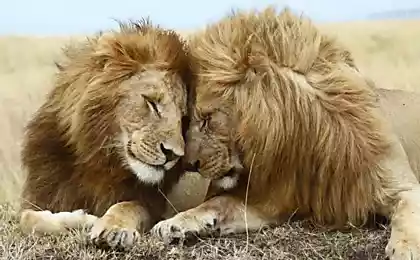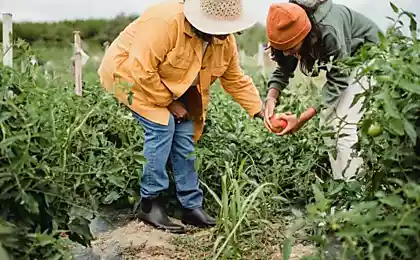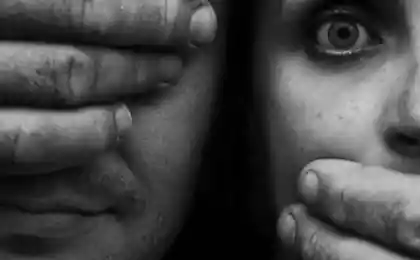495
Each of us has his hunger
I read an article once, where were the results of research on the subject:
"Why are some people in dangerous situations tend to take action to rescue themselves and others become paralyzed and in most cases die?».
Squeeze these studies:
I'm not an expert in the field of emergencies, I work in the mental health field, so I think that know about "thin places" and set criteria for their own safety is very important.
I'll start in order, slowly.
Many of us (if not everyone) has their own "thin places." They are formed due to many circumstances — like nervous system, of traumatic experience, the environment in which you grew and formed personality.
If the child grew up in a family where there was a lot of violence, the violence was the norm — this is the environment in which it was formed and have adapted to it.
By violence I mean not only physical violence, but also depreciation, disrespect, disregard, not the symbol of those basic things that everyone should know in order to successfully integrate into the environment (eg. that way you need to go on a green light or example. story about sex in a safe and child-friendly form).
So, "a thin place" for such has grown the child will identify and secure for themselves and others defending the borders.
People who grew up in such families, generally, and in adult life tend to allow against itself too much. For example, remain in relationships in which fall, do not dare to defend their rights at work, find ourselves in situations and relationships where they are used.
Where a person who grew up in a respectful and accepting relationships, rears, or runs out of relations, such people fail to recognize the danger to their psychological well-being, and the alarm starts only when the detected internal destruction.
Or another option is — if you even remotely like the first signs of borders, rising fury (accumulated over all the years of injustice in the family), and force rage is inadequate to the situation. And again, it turns out the destruction — finding after the emanation of the anger burned to ashes by a space of relationship, a feeling of guilt and/or shame.
Or even that rage can draw on and cometesimals to go into depression.
In General, a lot of variants and all of them in most cases sad.
There is another "trick" — the formation of sverhsoldata.
Personal value is a basic conviction of a person, formed from his experience (not intellectual reasons) and personal orientation.
Values, as a rule, are formed on the basis of sad experience.
Sixty five million two hundred sixty five thousand sixty
For example, if a man was once betrayed and very hurt in this experiment, it can form the value — loyalty.
If passed, for example, through the hunger — the food will be value.
If you are familiar loneliness, the proximity will be valuable. And so on.
If a basic need was not satisfied with for a long time, the talk is not about the value, and overvalued. This is especially true of childhood experiences.
For example, if the child is in childhood have not experienced the bodily closeness with their parents, then this deficit will be expressed in the strongest hunger for physical intimacy, which in adult life is likely to develop into the importance of bodily intimacy with partner relations.
If the child-parent relationship was distant, where my parents were functional (wear-wearing-fed), but were not friends with the child, did not notice him as a person, not interested and do not support it in the experiences (especially in the case of failures), then, most likely, in adult life hunger close will be so great that difficulties may arise in relationships with partners relationships — a lot of people so much and so deeply do not need to be in the vicinity.
If the child is often left abruptly (manger, a sudden relocation to the grandparents), boarding schools, etc., it is likely that in the future can be expressed in the control and the constant desire of togetherness with your partner.
And so on. I think the scheme is clear.
So, I think, in varying degrees, each of us has his hunger. And if we don't know, it could lead to unpleasant, in my opinion (and experience) the consequences.
For example, fascinated by quenching your hunger, you can discover yourself (but when on the ears) in a dependent relationship (which is, incidentally, not just "I can't be without you", it is a terrible deal, as to find himself in a drinking bout, although for a long time it seemed, "I can at any time stop", and at stake is the self, the mental and physical health), you can regularly find some unpleasant stories violence and deception, and wonder, "how, again, this to me could happen?"you can walk around in the same circle, repeating the same scenario in relationships, revealing itself already exhausted in this circle, but do not realize — as I went(La) on the circle?
So, detection and awareness of their personal deficiencies, in my opinion, are extremely important for your own safety lesson.
For if there be first a clear knowledge of himself that "here in this place I'm hungry", it is possible this place stands out with special attention.
Because if it is not vigilant, the hunger veiled eyes and mind, it is not clear where drawn like a magnet, all the potential threats go into the background and away we go.
It looks like a swollen from hunger a person sees food all — if it does not flash the alarm "if we will guzzle you will die", all, hi.
If you know in advance about such their hungry, then the hunger will not decrease. However, it is possible to containerwith the time (pause) to check the situation on the subject — than it will have to pay, how much is safe for me, "food", in what quantities, it can start to try and how much time to be vigilant, to build on the reality, to test the utility for yourself what is happening.
Such attentiveness to reality and time will allow, that is, to scan the field, to keep more resources to recognize possible dangers and troubles.
Another, in my opinion, the useful thing about feelings of usefulness. Self-rating even very stable in this sense, man is a fickle feature. I mean, it changes in one direction and then the other constantly. Someone more, someone less. Not the essence. It is important that when we have not the best of times, even a little pleasure begins us is very appreciated. And for this we can not see possible Trouble.
So, in my opinion, useful in Agolada able to think and create for themselves the criteria for what you are in relation to itself, not willing to let. And most importantly — why?
What is more real, honest to itself, substantiation you will find, the easier it is for them to integrate, assign in experience and to rely on them protecting themselves from trouble.published
Author: Ksenia Aleeva
P. S. And remember, only by changing their consumption — together we change the world! ©
Source: alyaeva.livejournal.com/85917.html
"Why are some people in dangerous situations tend to take action to rescue themselves and others become paralyzed and in most cases die?».
Squeeze these studies:
- people become paralyzed or calm down (!) (for example, when the aircraft is burning or when a tsunami, Typhoon, earthquake, etc.), because in their view, they could not get into this situation;
- the men, who admitted the possibility of falling into a situation advance thought over their actions and because of this they were saved because they knew what to do.
I'm not an expert in the field of emergencies, I work in the mental health field, so I think that know about "thin places" and set criteria for their own safety is very important.
I'll start in order, slowly.
Many of us (if not everyone) has their own "thin places." They are formed due to many circumstances — like nervous system, of traumatic experience, the environment in which you grew and formed personality.
If the child grew up in a family where there was a lot of violence, the violence was the norm — this is the environment in which it was formed and have adapted to it.
By violence I mean not only physical violence, but also depreciation, disrespect, disregard, not the symbol of those basic things that everyone should know in order to successfully integrate into the environment (eg. that way you need to go on a green light or example. story about sex in a safe and child-friendly form).
So, "a thin place" for such has grown the child will identify and secure for themselves and others defending the borders.
People who grew up in such families, generally, and in adult life tend to allow against itself too much. For example, remain in relationships in which fall, do not dare to defend their rights at work, find ourselves in situations and relationships where they are used.
Where a person who grew up in a respectful and accepting relationships, rears, or runs out of relations, such people fail to recognize the danger to their psychological well-being, and the alarm starts only when the detected internal destruction.
Or another option is — if you even remotely like the first signs of borders, rising fury (accumulated over all the years of injustice in the family), and force rage is inadequate to the situation. And again, it turns out the destruction — finding after the emanation of the anger burned to ashes by a space of relationship, a feeling of guilt and/or shame.
Or even that rage can draw on and cometesimals to go into depression.
In General, a lot of variants and all of them in most cases sad.
There is another "trick" — the formation of sverhsoldata.
Personal value is a basic conviction of a person, formed from his experience (not intellectual reasons) and personal orientation.
Values, as a rule, are formed on the basis of sad experience.
Sixty five million two hundred sixty five thousand sixty
For example, if a man was once betrayed and very hurt in this experiment, it can form the value — loyalty.
If passed, for example, through the hunger — the food will be value.
If you are familiar loneliness, the proximity will be valuable. And so on.
If a basic need was not satisfied with for a long time, the talk is not about the value, and overvalued. This is especially true of childhood experiences.
For example, if the child is in childhood have not experienced the bodily closeness with their parents, then this deficit will be expressed in the strongest hunger for physical intimacy, which in adult life is likely to develop into the importance of bodily intimacy with partner relations.
If the child-parent relationship was distant, where my parents were functional (wear-wearing-fed), but were not friends with the child, did not notice him as a person, not interested and do not support it in the experiences (especially in the case of failures), then, most likely, in adult life hunger close will be so great that difficulties may arise in relationships with partners relationships — a lot of people so much and so deeply do not need to be in the vicinity.
If the child is often left abruptly (manger, a sudden relocation to the grandparents), boarding schools, etc., it is likely that in the future can be expressed in the control and the constant desire of togetherness with your partner.
And so on. I think the scheme is clear.
So, I think, in varying degrees, each of us has his hunger. And if we don't know, it could lead to unpleasant, in my opinion (and experience) the consequences.
For example, fascinated by quenching your hunger, you can discover yourself (but when on the ears) in a dependent relationship (which is, incidentally, not just "I can't be without you", it is a terrible deal, as to find himself in a drinking bout, although for a long time it seemed, "I can at any time stop", and at stake is the self, the mental and physical health), you can regularly find some unpleasant stories violence and deception, and wonder, "how, again, this to me could happen?"you can walk around in the same circle, repeating the same scenario in relationships, revealing itself already exhausted in this circle, but do not realize — as I went(La) on the circle?
So, detection and awareness of their personal deficiencies, in my opinion, are extremely important for your own safety lesson.
For if there be first a clear knowledge of himself that "here in this place I'm hungry", it is possible this place stands out with special attention.
Because if it is not vigilant, the hunger veiled eyes and mind, it is not clear where drawn like a magnet, all the potential threats go into the background and away we go.
It looks like a swollen from hunger a person sees food all — if it does not flash the alarm "if we will guzzle you will die", all, hi.
If you know in advance about such their hungry, then the hunger will not decrease. However, it is possible to containerwith the time (pause) to check the situation on the subject — than it will have to pay, how much is safe for me, "food", in what quantities, it can start to try and how much time to be vigilant, to build on the reality, to test the utility for yourself what is happening.
Such attentiveness to reality and time will allow, that is, to scan the field, to keep more resources to recognize possible dangers and troubles.
Another, in my opinion, the useful thing about feelings of usefulness. Self-rating even very stable in this sense, man is a fickle feature. I mean, it changes in one direction and then the other constantly. Someone more, someone less. Not the essence. It is important that when we have not the best of times, even a little pleasure begins us is very appreciated. And for this we can not see possible Trouble.
So, in my opinion, useful in Agolada able to think and create for themselves the criteria for what you are in relation to itself, not willing to let. And most importantly — why?
What is more real, honest to itself, substantiation you will find, the easier it is for them to integrate, assign in experience and to rely on them protecting themselves from trouble.published
Author: Ksenia Aleeva
P. S. And remember, only by changing their consumption — together we change the world! ©
Source: alyaeva.livejournal.com/85917.html
Happy people are not fond of psychology
John Fowles: Freedom of will in a world without freedom is like a fish in a world without water























